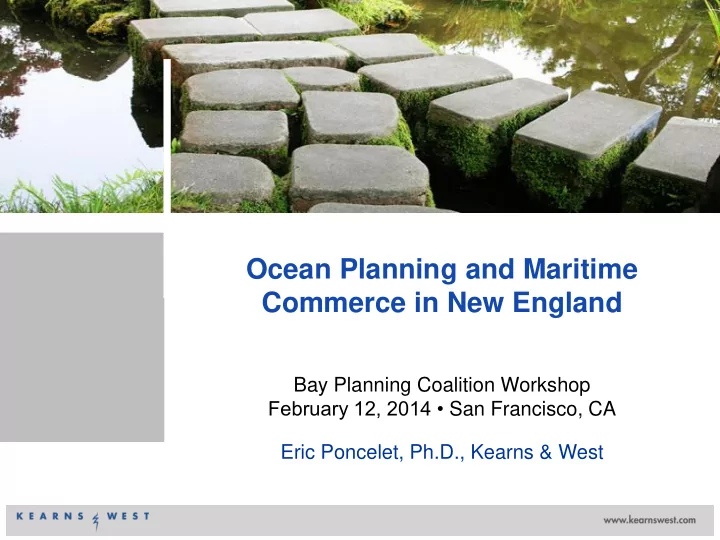

Ocean Planning and Maritime Commerce in New England Bay Planning Coalition Workshop February 12, 2014 • San Francisco, CA Eric Poncelet, Ph.D., Kearns & West
Presentation Outline • Background • Case study: Ocean Planning in New England • Key Issues and Trends for maritime commerce • Potential role for Ocean Planning • Moving forward
Background Regional Ocean Partnerships • Caribbean Regional Ocean Partnership • Council of Great Lakes Governors • Governors’ South Atlantic Alliance • Gulf of Mexico Alliance • Hawai’i Ocean Resources Management Plan • Mid-Atlantic Regional Council on the Ocean • Northeast Regional Ocean Council (ME, NH, MA, CT, RI; 2006) • Pacific Regional Ocean Partnership • West Coast Governors Alliance on Ocean Health
NROC – Issue Areas • Ocean and coastal ecosystem health • Coastal hazards resilience • Ocean planning
NROC Outreach to Support Ocean Planning • Fishing (commercial and recreational) • Ocean industries
NROC Outreach to Maritime Commerce Sector • Process – Stakeholder assessment (interviews, on-line survey) – Working sessions (key ports in each state) – White paper • Outreach topics – Key issues and trends facing the maritime commerce sector – Hopes for ocean planning – Information gaps/needs – How to best reach out to and engage the maritime sector
Findings: Key Issues and Trends • Emerging use conflicts for coastal ocean space • Dredging needs – existing and driven by increasing container ship sizes; disposal challenges • Ecological and environmental • Economic implications
Findings: Potential Roles for Ocean Planning • Address key ocean use conflicts (fishing, transportation, aquaculture, wind energy) – Examples: Right whales and shipping, placement of offshore energy • Bring affected stakeholders to table • Consolidate and integrate existing information • Support better integration of regional transportation planning across road, rail, and water modes • Foster integration across state and federal efforts in New England • Help policy makers better understand marine issues (e.g., the economics of maritime shipping and commerce)
Findings: Potential Role for Ocean Planning Caution: Ocean planning should not create winners and losers • Among competing ports • Among different industries (e.g., shipping, fishing, aquaculture, and energy)
Findings: Support for Improving Access to Marine Spatial Information • Locations of different ocean uses • Automatic Identification Systems (AIS) data viewed as good source for characterizing shipping activity – advice on how to interpret this information (for different vessels, cargoes) • Identified additional data gaps and needs
Ocean Planning In New England: Moving Forward • Northeast Regional Planning Body (RPB) convened in late 2012 • Staff support from NROC • Stakeholder engagement – RPB meetings open to public – Public workshops and comment opportunities – Ongoing informal outreach to ocean industries and other stakeholders • Prepared draft goals, objectives, actions in 2013 • Early 2014, released “Framework for Ocean Planning in the Northeast United States”
Questions? Eric Poncelet, Ph.D. Senior Director/Senior Mediator Kearns & West eponcelet@kearnswest.com www.kearnswest.com
Recommend
More recommend